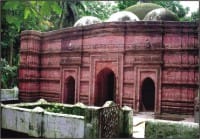Old glory in desperate need of attention

Pir Pukur Mosque at Barobazar, Jhenidah.Photo: STAR
Barobazar in Jhenaidah district is famous for archaeological treasures including ten mosques, eleven dighi (ponds) and four graves from the Sultanate period. Twelve awliya (sages) lived in twelve different bazars in the area. Thus, the area got its name 'Barobazar'.
The area is located 11 kms to the south of Kaliganj upazila and 26 kms away from district town. Dhaka-Khulna highway runs through this town.
These beautiful terracotta structures were built during the Sultanate period. The mosques have lost most of their intricate designs due to lack of proper maintenance and supervision.
Although time and nature have ravaged most of the red terracotta plaques on the (app.) 500-year old mosques, the structures bear testimony to the legacy of what once was.
Cracks have developed on the walls. Shrubs and trees have been growing all over the structures. Atiar Rahman, caretaker of the mosques said, a stone inscription was recovered while discovering the Satgachhia Mosque in 1987. "The name, Mahmood Ibn-e-Hossain Saha Sultan Al-Muzaffar, was inscribed on the stone which is preserved at the Rajshahi University Museum," said Atiar Rahman. He added that the area was known as 'Mohammadibaad' at that time.
The mosques are -- Galakata Mosque, Jore Bangla Mosque, Gorar Mosque, Pir Pukur Mosque, Chiraagdani Mosque, Satgachhia Mosque, Shukur Mallick Mosque, Noongola Mosque, Pathagar Mosque and Manohar Mosque.
The dighis are called Kharer dighi, Saudagar dighi, Pir pukur, Gorar pukur, Golakata pukur, Jore Bangla dighi, Satgachhia dighi, Khondokar dighi, and Ber dighi.
Barobazar was once an ancient capital on the Bhairav River. It was the only water route to reach the eastern region from Gaur and Patliputra.
The stones of Shat Gambuj Mosque in Bagerhat resemble these ten mosques in Barobazar. It is believed that these stones were transported by the river.
Eventually, the Sultanate period came to an end and the provincial capital became isolated. In course of time, these mosques were covered under earth and bushes.
In 1987, Khulna regional archeological department discovered these sites. Abul Kalam Azad, chairman of Barobazar union said that the roads that lead to the mosques are uneven and rugged. People from different parts of the country come to visit these archeological sites but there is no accommodation for the tourists.

 For all latest news, follow The Daily Star's Google News channel.
For all latest news, follow The Daily Star's Google News channel. 



Comments